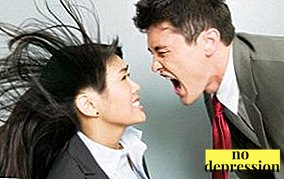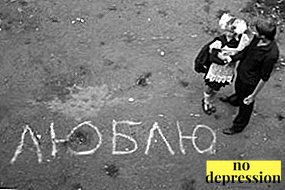The clock has long since passed midnight, but it still doesn’t work out to sleep - anxiety is in my heart. What is this feeling, why does it arise and how does it manifest itself? Why anxiety, especially if there is no reason for it, is better to avoid? We know the answers and tell you about effective ways to deal with anxiety.
What is anxiety?
Anxiety is a feeling of uncertainty, which is accompanied by a premonition of negative events. Most often, this emotion is unreasonable, it only worsens health, violates stability.
Anxiety causes the body to be in constant "alert" to overcome potential danger. It leads to exhaustion of forces, negatively affects psychological health.
Anxiety is accompanied by two conditions. The first is anomalous obsessive anxiety that has no specific reason. The other is manifested on the physical level: rapid heartbeat, tremor, dizziness, nausea, etc.
Sources of anxiety
Psychologists say that there are many reasons for anxiety. The most common:
- childhood injuries and phobias;
- fear;
- remorse,
- severe illness;
- constant stress;
- chronic fatigue.
There are not rare cases when anxiety is caused by a disease that we may not know about, but we continue to think that there is no particular reason to be nervous.
Do not confuse anxiety with fear, since the latter always has the soil, it does not just happen. Fear is a natural defensive reaction to a danger that develops in an extreme situation. It is easier to visualize, for example, if a person feels afraid of being bitten by a spider, this is due to his arachnophobia (fear of spiders). Anxiety, in turn, most often occurs before something "unknown".
Anxiety and anxiety: types, nature of manifestation
Depending on the symptoms and the nature of the manifestation of anxiety is:
- Social - manifested in situations related to society. It is expressed by the fear of people, their opinions, public speaking, communication with their superiors.
- Situational - short-term, caused by a premonition of any situation; terminated at the time of its completion.
- Neurotic - exaggerated perception of danger. Often turns into a chronic condition caused by strong experiences in the past (children's injuries, phobias, unpleasant situations). It is always manifested psychological, physiological disorders, adversely affects the entire life activity.
- Personal - depends on the nature of the character. This is the individual tendency to be anxious, even in non-dangerous situations.
- Existential connected with the search for yourself and the meaning of life. Here, anxiety in the soul is the fear of losing yourself, the meaning of life, lack of self-confidence, your actions.
- Adaptive - the most normal manifestation of anxiety, which is not permanent, is a natural excitement before any event. Adaptive is responsible for the body's reaction to danger, thereby warning against it.
Anxiety symptoms
Although anxiety is not always a pathological condition, most of its cases are triggered by non-existent dangers, or by those that acquire unjustified importance. Often, arising out of nothing, such a state is accompanied by a feeling of irritability, helplessness, as well as other symptoms, including:
- psychological stress;
- deterioration of concentration and attention;
- reduced productivity;
- distraction, fussiness;
- fearfulness;
- constant waiting for the worst events;
- restlessness, overhead;
- physical disorders (excessive sweating, heart palpitations, sleep and appetite disturbances, shortness of breath, headache, chronic fatigue).
Any of these symptoms indicates an unstable body. It is necessary to fight with constant anxiety, because to live, experiencing discomfort and tension every day, is impossible.
How to get rid of anxiety
Find the cause of fear
It is necessary to identify the person, situation or object that causes irritation. When we know what we are afraid of, we can more adequately assess the situation, visualize it, try to come up with methods of struggle, or avoid irritants.
Do not try to keep up always and everywhere.
Psychologists say that we live in an age of vanity and inner division. The very awareness of the speed of the flow of events introduces an imbalance. The consequence is that the fear of “not catching up” over the course of life develops. Stability is good, but your own health should always be a priority. If you live a measured life, plan your day in time, you can save yourself from unnecessary anxiety.
Live your life
Anxiety and anxiety may arise from experiences that concern others.. It is not only about excitement for loved ones. Many emotional people after watching scenes with disasters or diseases of others starts to panic.
By transferring other people's sorrows to ourselves, we provoke the appearance of new phobias or fears. Which exit? Live your life, appreciate every moment and not “wind up” yourself with thoughts and fantasies about what you see or hear. From fate, there is no escape, and unreasonable anxiety has a negative effect on the entire body.
Add positive emotions
Anxiety often occurs due to a lack of positive emotions. Do not worry about trifles. It is better to go for a walk with friends, shopping or just arrange a cozy evening watching a movie. If you manage to relieve tension, a cheerful mood is provided for several days.
Not to miss
It often happens that out of boredom we indulge in bad memories, become apathetic, anxiety appears. The treatment in this case is simple: spend your free time with benefit, meet new people, learn new hobbies, read interesting and useful literature, play sports. In the end, you can rearrange the furniture or, finally, clean the walls in the hallway. Physical labor dissolves anxiety with fatigue, the desire to rest.
Calm down
If anxiety attacks are constantly overcome at the wrong time, then it’s time to master the basics of yoga and breathing exercises. Improvement is useful in any critical situations: deep breathing calms, and some yoga asanas relieve tension, help to keep yourself in shape.
Take medicine for anxiety
If anxiety becomes chronic, and it is impossible to relax and distract, then it’s time to approach the problem from the medical side. Most often in such cases prescribe tranquilizers or sedatives, which reduce anxiety, but do not affect physical activity. But self-medication can not be engaged, because only an experienced doctor can take into account all the risks and individual characteristics of the body.
The speed of life and its frequent antics make you worry about and without. For many, anxiety has become a familiar emotion. But it is easy to get rid of it! It is necessary to rest more, to lead a healthy lifestyle, to occupy the brain with useful information, to avoid negative thoughts. Listen to our advice to gain stability and forget about the imbalance forever.



